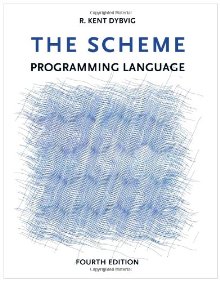
|
FreeComputerBooks.com
Links to Free Computer, Mathematics, Technical Books all over the World
|
|
- Title The Scheme Programming Language, 4th Edition
- Author(s) R. Kent Dybvig
- Publisher: The MIT Press; 4 edition (September 30, 2009)
- Paperback 512 pages
- Language: English
- ISBN-10: 026251298X
- ISBN-13: 978-0262512985
- Share This:

|
Scheme is a general-purpose programming language, descended from Algol and Lisp, widely used in computing education and research and a broad range of industrial applications. This thoroughly updated edition of The Scheme Programming Language provides an introduction to Scheme and a definitive reference for standard Scheme, presented in a clear and concise manner. Written for professionals and students with some prior programming experience, it begins by leading the programmer gently through the basics of Scheme and continues with an introduction to some of the more advanced features of the language.
The fourth edition has been substantially revised and expanded to bring the content up to date with the current Scheme standard, the Revised6 Report on Scheme. All parts of the book were updated and three new chapters were added, covering the language's new library, exception handling, and record-definition features.
The book offers three chapters of introductory material with numerous examples, eight chapters of reference material, and one chapter of extended examples and additional exercises. All of the examples can be entered directly from the keyboard into an interactive Scheme session. Answers to many of the exercises, a complete formal syntax of Scheme, and a summary of forms and procedures are provided in appendixes.
The Scheme Programming Language is the only book available that serves both as an introductory text in a variety of courses and as an essential reference for Scheme programmers.
About the Authors- R. Kent Dybvig is a Professor of Computer Science at Indiana University and principal developer of Chez Scheme.
- Scheme Programming Language
- LISP Programming Language
- Functional Programming
- Artificial Intelligence, Machine Learning, and Logic Programming
- Prolog Programming
 Similar Books:
Similar Books:
-
 Write Yourself a Scheme in 48 Hours (Jonathan Tang)
Write Yourself a Scheme in 48 Hours (Jonathan Tang)
A comprehensive first course in Scheme, covering all of its major features: abstraction, functional programming, data types, recursion, and semantic programming. By the time you finish, you should be fairly fluent in both Haskell and Scheme.
-
 Sketchy LISP: Introduction to Functional Programming in Scheme
Sketchy LISP: Introduction to Functional Programming in Scheme
This book is a step-by-step introduction to functional programming in Scheme. By means of numerous examples of varying complexity, it takes the reader on an entertaining and informative tour through the language.
-
 Functional Programming in Scheme (Kurt Normark)
Functional Programming in Scheme (Kurt Normark)
This is a book about functional programming in Scheme, which is a pragmatic choice of programming language in the functional programming paradigm, with unique flexibility due to the membership of the Lisp family of languages.
-
 Simply Scheme: Introducing Computer Science, 2nd Edition
Simply Scheme: Introducing Computer Science, 2nd Edition
This book works hard to make the somewhat tricky ideas of Scheme accessible. It stresses small sections on key language features, from basic functions, variables, and onward to recursion and other functional programming concepts.
-
 Concrete Abstractions: Computer Science using Scheme
Concrete Abstractions: Computer Science using Scheme
This book covers the basics of programming and data structures, and gives first-time computer science students the opportunity to not only write programs, but to prove theorems and analyze algorithms as well.
-
 Purely Functional Data Structures (Chris Okasaki)
Purely Functional Data Structures (Chris Okasaki)
This book describes data structures from the point of view of functional languages, with examples, and presents design techniques that allow programmers to develop their own functional data structures. All source code is given in Standard ML and Haskell.
-
 Object-Oriented vs. Functional Programming (R. Warburton)
Object-Oriented vs. Functional Programming (R. Warburton)
This book discusses similarities between these programming paradigms and points out that both FP and OOP are actually moving closer toward one another. One prominent example is the use of lambda expressions in Java and other OOP languages.






